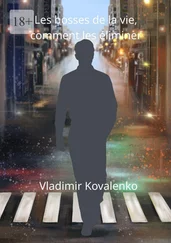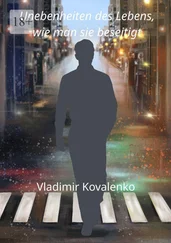That fall mother finally found a friend … Mrs. Guček from Moste … a tiny, toothless woman in a broad-brimmed hat with thickly made-up lips … She lived in an apartment building near the railroad crossing barrier. She told us about her son, who, when he was returning home from his military service, couldn’t wait to see her and instead of waiting to get off of the train at the station, jumped off the car at a ramp, breaking an arm and a leg. Her son was a little, powerful fellow with short hair, a baker by trade … Mother had met Mrs. Guček while out at the store buying buttons, and she brought her home … Mrs. Guček played a small clarinet, which she carried with her in her bag. In better times she had also played the piano … Vati couldn’t stand her. Nor could I … She wore thick knitted mittens on account of her sensitive hands. She never took her hat off … She spoke in fine phrases and with exquisite care. She’d had a very good education, we noticed that right away. Her father had been a corset and glove merchant … Before the great war he had had six employees. The door to his atelier was constantly opening or closing. He was wiped out in the financial scandal of some bank in Vienna. Her husband, a government official, Peter’s father, was dead … Everything that Mrs. Guček had to say turned into a wistful dream … She drank tea and often had supper with us, although she must have noticed that we didn’t have anything … Most of all she liked to take a spoon and scrape the scorched cornmeal mush or macaroni stuck together off the bottom of the pot, which was also what I liked to do and why mother always set it aside for me. So this made me resent her even more. But she did play the flute nicely. Like the early morning twitter of birds in the woods … the splash of water … a pan pipe … the sorrow of an abandoned girl … that’s how it sounded … She had a wide repertoire. She would sit on the barrel with her legs crossed. Or right on a skin on the floor … She got more and more reckless. “What would you like?” she would ask. “Ein Walzer,” Clairi said. Sometimes she would mimic an entire ensemble, an orchestra or, with her hands cupped around her mouth, a trumpet … she kept time with her foot … “Cuckoo!” she would say to Gisela, who would be hiding under a blanket. Outdoors she would wear a veil. On account of her skin. She would come uninvited, out of the blue. She and mother spent a lot of time chatting, getting angry about things, crying together … she was ready to cry at the drop of a hat … She would talk about this and that, she knew a lot of people. And when she didn’t she would say, “The rumor is that …” She even knew the old lady who kept watch at her window to make sure I didn’t spill any water, as well as her stepdaughter, who would call her stepmother to the window the instant she saw me … About the bishop, who was fond of drink, which is why he was bloated and flushed all the time, and who also had … and from here on she whispered in mother’s ear, but so loudly that it thundered and I could hear everything: had women, nuns, the sisters, ladies from some of the better families … Despite the fact that she was annoying and made us angry and that we also laughed a lot at her expense, mother couldn’t get by without her … She told her about the theater, the opera, dances … she was very well-versed. Mother had a weakness for actors: once, in Basel in 1913, on the Elizabethplatz, she had had the actress Maria Petri as a boarder … and she still had photos of her … later she killed herself over an unhappy love affair … One evening Mrs. Guček napped in a hammock next to mother until eleven at night, when they both left for the movies, a special showing just for adults that young people weren’t allowed to see … Mother came home at two in the morning, for the first time in her life and in a carriage, at that, which Mrs. Guček got for her through a friend who was a driver … All of us shot up in bed when the hitch stopped outside our house.
One day Clairi — as a result of a humorous incident in which, on the street outside the hospital she was startled by a streetcar and dropped a box of furs that she was taking to offer some customer in Tabor — made the acquaintance of an older gentleman who picked up her items for her and helped her repack them in a park on the other side of the street. A white-haired gentleman, all furrows and wrinkles. He invited her out on a date at the Tabor Café and she took me along, because she didn’t quite trust this casual acquaintance … He really was a white-haired, wizened man, but to me he seemed more like an old show-off, awkward and not very bright, at that, which I inferred from the fake way he behaved, but most of all from the unsavory jokes he was constantly cracking … On top of that, he talked in a falsetto, and if only his hair, though in Clairi’s opinion quite attractive, had not been cut in a ring of fringe at the top like the fathers … So this was the suitor I’d had to bathe, brush my hair, cut my fingernails and sit as still as a statue at a wobbly table for, and on top of that translate his inanities for Clairi and hers back to him. He didn’t care much for me, either, I noticed that instantly, I got in his way … oh, I knew what he wanted and I could tell from looking at Clairi that from one minute to the next he was becoming less and less to her liking. He ordered cake and raspberry juice. I got nothing out of the whipped cream or the syrup, because everything was so polite and forced. When he paid, he pulled a sheet of paper out of his pocket, which contained a banknote folded in three … Only then did my eyes open, only then did I begin to feel sorry for him and I felt ashamed. But it was too late for me to become any nicer toward him, at least not outwardly.
Then Clairi got to know a military family. Actually the Croatian wife of a non-commissioned officer at first, a stout woman with a broad face and lots of hair, Spanish-looking with lots of earrings and a beauty mark under one eye. She had brought Vati her red fox fur to mend. She knew how to tell fortunes from coffee dregs and cards … read palms … and she knew a whole bunch of superstitions … she knew lots of unusual Balkan dishes and bloody love stories. Her bracelets would clatter like castanets when she told them and her voice, her hair, her hands, her breasts, all of her would quiver. Clairi was drawn to exotic and romantic things … freedom, wind, fire. This was something for her! A free life in which every sign in the heavens and on earth has its own hidden meaning, every gesture its hermetic secret … Clairi would stare like a child. “So was?… Was Sie nicht sagen … Ist das möglich?…” †She believed that our great-great-grandfather might have been a Gypsy after all … That was probably why we were constantly on the move, living from hand to mouth … why we liked fire, wind, trees, rain … and why we would never lose our will to live. At the same time in her mind she was cautiously assembling a judgment about this exceptional person … What an army dimwit … what a schemer, trying to get her tasteless fur, those “twelve worn-out foxes on one sow” mended for little or nothing … this vain, pampered shystress of fortunes and oracles. But then again … some age-old wellspring of faith in the instincts, in the senses, in the inextricability of phenomena … a door grown over with vines, beyond which there was another door, and beyond that yet another … until you finally ran into the grace that bestowed its revelation on you … Mira’s husband was a sergeant. One Sunday the sergeant came with her. He was a short, handsome, swarthy man reminiscent of Valentino. He wasn’t an officer, but still … He had white gloves and a saber, and from the saber’s hand guard a number of tricolor ribbons hung down. He hadn’t come empty-handed. He brought a bottle of brandy and some bacon. He sat down at the table and talked with Vati half in Serbo-Croatian, half in German, with a bit of Slovene thrown in. He was for Hitler … Vati was, too … Hitler had two roles to fulfill, so claimed Sergeant Mitič. He was bringing abundance to all the poor of the world and in order to do that he was also strengthening the offensive capabilities of his army … The world has never seen an army like this … powerful, mechanized, disciplined. He’s going to defeat all his opponents and establish a new order … And something else: Hitler is going to beat it into all the weaklings’ fat heads that only the person who is least afraid wins. Nobody is going to be able to hold out against that kind of force, which arouses such terror in weaklings. They will all be ground into nothing!.. And as proof that all this is going to happen, take the German people. Whether by trick or courage, it doesn’t matter — they have to see the thing through to the end … the time has come for all nations to pass a test of their viability. A human arm can be transformed into a club … cowards have to change into heroes, unbounded creatures … Hitler says, “Wir wünschen alles zu machen, daß die Form Mensch nur ein Zufall bleibt und eine Übergangsphase!..” ‡This ought to become the plan and goal of every nation …
Читать дальше












